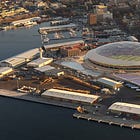Australia, PNG Sign Defense Treaty Communique in Historic Alliance Move
Agreement would mark Australia's first new alliance in more than 70 years as PNG seeks security partnership
Today’s email is brought to you by Empower your podcasting vision with a suite of creative solutions at your fingertips.
Australian Prime Minister Anthony Albanese and Papua New Guinea Prime Minister James Marape signed a joint communique Wednesday outlining a mutual defense treaty that would establish Australia's first new alliance in more than 70 years.
The signing ceremony, held the day after PNG's 50th independence anniversary celebrations, represents a significant shift in regional security arrangements and would make the PNG-Australia pact only the third formal alliance in Australian history, alongside ANZUS with New Zealand and the United States.
"This treaty will elevate our relationship to the status of an alliance," Albanese said during a joint press conference at Government House. "It will be Australia's first new alliance in more than 70 years and only the third in our entire history."
The communique establishes core principles for the treaty, though the agreement must still pass through cabinet processes in both countries before final signing and parliamentary ratification. Both leaders emphasized the treaty text has been agreed upon by negotiating teams.
Truth matters. Quality journalism costs.
Your subscription to Mencari directly funds the investigative reporting our democracy needs. For less than a coffee per week, you enable our journalists to uncover stories that powerful interests would rather keep hidden. There is no corporate influence involved. No compromises. Just honest journalism when we need it most.
Not ready to be paid subscribe, but appreciate the newsletter ? Grab us a beer or snag the exclusive ad spot at the top of next week's newsletter.
PNG Initiative Drives Partnership
Marape stressed that Papua New Guinea initiated the defense partnership request, addressing his country's current security limitations.
"As your Prime Minister, I made a conscious choice, a choice knowing our history, knowing our culture, knowing our ethic value and moral value systems, knowing our democratic ideals. We made conscious choice that Australia remains our security partner of choice," Marape said.
The PNG leader acknowledged his country's defense capabilities remain insufficient 50 years after independence.
"I want to say, and with no element of the same, but admitting where we are, 50 years on, our defense capacity is not at a level where your prime minister or your defense minister or defense commander can defend our 462,840 square kilometers of land or 3 million square kilometers of ocean space we have," Marape said.
PNG currently maintains approximately 7,000 military personnel, including 5,000 land soldiers, 1,000 air force members and 1,000 naval personnel, according to Marape.
Mutual Defense Commitments
The treaty contains mutual defense provisions recognizing shared security interests between the neighboring nations.
"It contains a mutual defence commitment under which both countries recognise that both Australia and PNG have a mutual interest in our security," Albanese explained. "It also will be a reflection of our shared commitment to regional security, our shared values and the depth of our partnership."
The agreement will allow expanded training opportunities for PNG citizens within the Australian Defence Force, building on existing cooperation that includes a PNG citizen serving as second-in-command of an Australian division in Townsville.
"This treaty will do is to allow for even further training and experience of Papua New Guinea citizens in the Australian Defence Force," Albanese said.
Historical Context and Geographic Reality
Both leaders emphasized the deep historical connections between their nations, dating to before PNG's 1975 independence when it was administered by Australia.
"Before 1975, the military units we have in our country were Australian military units. The government structure we had in our country were Australian government structure. The flag we had in PNG was Australian flag," Marape said.
Marape invoked memories of World War II cooperation, referencing the Papua Infantry Battalion that fought alongside Australian forces during the Kokoda campaign from 1942 to 1945.
"Just like the first Papuan infantry battalion, 1942 to 1945, in the just one single shotguns were working side by side with young Melbonians, young Sydneysiders, young Western Australians who were deployed into Kokoda to fight the war," he said.
The geographic proximity drives mutual security concerns, with the leaders noting that threats facing either nation would likely affect both.
"Threats that face us, it's exposure to Australia. Threats that face Australia, it's exposure to Papua New Guinea. We've got no choice," Marape said.
Cabinet and Parliamentary Processes
While the communique was signed Wednesday, both governments must complete domestic approval processes before the treaty becomes effective.
"The wording has been agreed to. The communique today has signed outlines precisely what is in the treaty. We're releasing that for everyone to see today," Albanese said.
Marape indicated his cabinet would consider the matter upon his return to PNG, with Deputy Prime Minister John Rosso chairing the session in his absence.
"When Cabinet resumes, this matter will be processed. I will be out of the country. Deputy Prime Minister will chair the cabinet to go through this, and as the cabinet process this, then it will go to the next stage," Marape said.
The treaty will then require parliamentary ratification in both countries. An upcoming PNG-Australia ministerial meeting will likely include the agreement on its agenda.
Timing and Anniversary Significance
The announcement's timing, coinciding with PNG's independence celebrations, was deliberate according to both leaders.
"I can't think of a better time for us to be releasing the communique than as I discussed with Prime Minister Merape on Monday for us to sign a communique today on the day after the 50th anniversary of the birth of this great nation," Albanese said.
Marape characterized the timing as symbolic of PNG's continued development priorities.
"Right after our first day from our 50th, my first work, and I've dragged my brother to make it his first work today," Marape said. "This is a pointer to everyone that work for our country the next 50 years must start with no rest for all of us."
Parliament Building Gift
Australia announced it will fund completion of PNG's Parliament House as a 50th anniversary gift, adding a D-wing to complement the existing C-wing constructed in 1985.
"I confirm that Australia's gift to PNG to commemorate the 50th anniversary of independence is the new wing of the Parliament building," Albanese said.
The completed structure will resemble a bird of paradise when viewed from above, according to Marape.
"It will look like the bird of paradise. Such an important, that we see on the flag and we see as such an important symbol of Papua New Guinea," he said.
Albanese described the gift as recognition of PNG's democratic institutions.
"It is also a signal from Australia that we value your democracy. And there's nothing better that we could do than fund the very institutional building that will house the growth of PNG's democracy going forward," he said.
Regional Relationships and Transparency
Questions arose about potential Chinese concerns regarding the defense treaty, given Beijing's growing Pacific influence. Marape emphasized PNG's transparent approach with all international partners.
"China has been an enduring friend of PNG for the last 50 years. We've maintained one China policy. But China also knows clearly that as far as security, we have security partners of choice," Marape said.
PNG will brief international partners about the defense agreement through diplomatic channels.
"In the next two days or so, I will dispense our defense minister to go first to China and elsewhere in all our supreme nations, USA, France, India, Indonesia, Malaysia, Singapore, Philippines, to inform all exactly what this is all about," Marape said.
The PNG leader stressed the decision reflects sovereign choice rather than external pressure.
"We ask them to, even through this press, that they do respect PNG government's choice of security partners. It is our choice. We adhere at home with Australia. We make this choice," he said.
NRL Team Connections Dismissed
Journalists questioned whether the defense treaty connected to PNG's planned entry into Australia's National Rugby League in 2028, but both leaders firmly separated the issues.
"Even if there was no rugby league team in NRL, this treaty would still have been signed today. This has nothing whatsoever to do with rugby league," Marape said.
The PNG leader expressed frustration with suggestions linking sports and security policy.
"So please, distance from small-minded. If something happens in PNC Australia by default, you'll be drawn into this conversation. And investing in defense is a defense strategy in itself of peace," Marape said.
Defense Investment Philosophy
Marape outlined his administration's broader security strategy, emphasizing that defense investment serves peace preservation rather than war preparation.
"In good times, investing in defense is a defense strategy in itself. You don't have to wait for war to invest in defense," he said.
The PNG leader described nightly concerns about his country's ability to respond to potential threats.
"As prime minister, I go to sleep every night worrying if someone invades my country, what is my defense for my country? Quickest, fastest, a country that better that said, we will work with you. If someone attacks you, we'll put a body in the light," Marape said.
Future Cooperation Framework
The treaty will enable broader security cooperation beyond military matters, including police and judicial sector development. PNG aims to modernize its law enforcement capabilities alongside defense improvements.
"Working with our police, working with our judiciary, working with the full government of the law and justice sector, in the next 10 years, we want to deliver PNG, a safer country, for all the children of this country to be safe," Marape said.
Current PNG police forces number approximately 10,000 officers, whom Marape wants to see "properly skilled, properly trained with the right ethics to make a defense of our law and justice sector interests."
Constitutional Processes Ahead
The agreement now faces standard democratic procedures in both nations before taking effect. Albanese emphasized respect for PNG's sovereignty throughout the process.
"What this is about is the processes of their cabinet that we respect. It's been a busy week this week. Monday, the cabinet members were in various parts of Papua New Guinea. That is perfectly understandable," Albanese said.
The Australian leader expressed confidence in eventual completion while acknowledging democratic requirements.
"There is no downside in this whatsoever. This is all upside for Australia and upside for Papua New Guinea," Albanese said.
The treaty represents a milestone in Pacific security arrangements, potentially influencing regional balance as both nations navigate growing strategic competition in the Indo-Pacific region.
Sustaining Mencari Requires Your Support
Independent journalism costs money. Help us continue delivering in-depth investigations and unfiltered commentary on the world's real stories. Your financial contribution enables thorough investigative work and thoughtful analysis, all supported by a dedicated community committed to accuracy and transparency.
Subscribe today to unlock our full archive of investigative reporting and fearless analysis. Subscribing to independent media outlets represents more than just information consumption—it embodies a commitment to factual reporting.
As well as knowing you’re keeping Mencari (Australia) alive, you’ll also get:
Get breaking news AS IT HAPPENS - Gain instant access to our real-time coverage and analysis when major stories break, keeping you ahead of the curve
Unlock our COMPLETE content library - Enjoy unlimited access to every newsletter, podcast episode, and exclusive archive—all seamlessly available in your favorite podcast apps.
Join the conversation that matters - Be part of our vibrant community with full commenting privileges on all content, directly supporting The Evening Post (Australia)
Catch up on some of Mencari’s recent stories:
It only takes a minute to help us investigate fearlessly and expose lies and wrongdoing to hold power accountable. Thanks!







